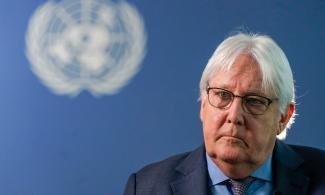
In an interview with Associated Press, Martin Griffiths, Head of the U.N. Office for the Coordination of Humanitarian Affairs, said the terrorists were still dangerous and threatening.
Nigeria’s fight against Boko Haram and ISWAP terrorists cannot be won on the battlefield, a top United Nations official has said.
In an interview with Associated Press, Martin Griffiths, Head of the U.N. Office for the Coordination of Humanitarian Affairs, said the terrorists were still dangerous and threatening.

He said the crisis needs more than $1billion in aid in 2022 to assist those hit by the decade-long conflict.
“You can't win on the battlefield,” Griffiths said as he urged more community development efforts.
“You win civil wars in the minds of the people who live there. If you don't have the communities on your side, it doesn't really matter how much else you've got on your side. You won´t make peace,” he added.
Griffiths urged the world not to forget the continuing devastation caused by Boko Haram and its offshoot, the Islamic State West Africa Province, together blamed for killing tens of thousands of residents and displacing millions.
“This is a very different kind of operation and very difficult also to deter… a grave and clear and present danger, obviously, to the people and a priority for the government.
“The world needs to remember this is a tragedy that needs to be sorted out,” he said.
Boko Haram, Nigeria’s homegrown Islamic extremist rebels, launched an insurgency in the country’s North-East in 2009, to fight against Western education and to establish Islamic Shariah law in Nigeria.
Their rebellion has spread over the years to the neighboring West African countries of Cameroon, Niger and Chad.
The conflict has resulted in approximately 35,000 deaths, according to the U.N. Development Program.
For each casualty, “an additional nine people, primarily children, have lost their lives due to lack of food and resources,” the U.N. agency estimated in a report in June last year.
Nigeria’s military continues to try to quell the violence especially in North-Eastern Borno State and the Lake Chad region, but the conflict has continued year after year.
The U.N. humanitarian chief said it’s not clear when displaced populations will be able to return to their homes.
Beyond the North-East, the North-West and central parts of Nigeria are experiencing violent attacks carried out by armed groups, who had traditionally worked as nomadic cattle herders and are caught up in a decade-long conflict with Hausa farming communities over access to water and grazing land.